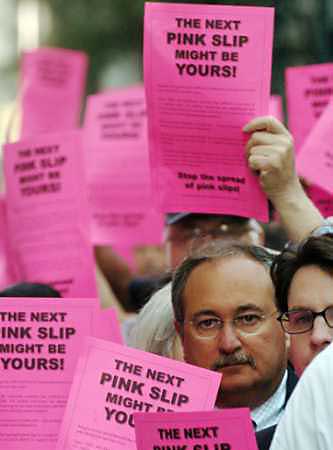Close window | View original article
Death Throes of the Middle Class 1
Even the still-employed middle-classes have lost their security.
One of the few remaining Democratic arguments with any real resonance is complaining about the death of the middle class. Nobody much cares about the plaints of the welfare poor because we've learned that throwing money at that problem only makes it worse. But it's a simple fact that, while working and middle-class wages have stagnated or decreased significantly over the last few decades, the wealthy have done quite well.
If you're a normal middle-class person, odds are that most things seem far more stressful now than you remember them being for your dad when you were a kid, or even his dad depending on your age. Yet people seem wealthier, and we definitely have more toys than we had in the 50s. How can this be?
The reason is based on a misunderstanding of what it means to be middle-class. Middle-classness is not defined by a paycheck's size, or precise requirements of a way of life. There are people with large paychecks who are not middle class, and people with smaller ones who are.
Being middle-class is not defined by the size of your bank account. It's defined by security - or to be more precise, the probability of an unforeseen catastrophe booting you down into the underclass.
On that measure, as it turns out, the middle class is indeed dying, just as the Democrats claim.

Jobs, Confidence, Security, and Prosperity
Another defining hallmark of the middle class is consumer debt, and there's good reason for this. No normal middle-class person has a big pile of cash available to just write a check for a house or a car; if you do, you're probably upper-class, not middle.
Over time, though, a middle-class family rationally expects to acquire both a house and a car or two. That's why, for most people, the important figure is not the total amount but the monthly payment. Can my budget handle a mortgage payment of $2,000 per month pus utilities, taxes, and maintenance? Can my salary cover a car payment of $500? Lowering or raising the total cost of the house or car is mostly irrelevant if the monthly payment stays the same.
Widespread availability of consumer credit has led directly to modern American prosperity. No, I don't have $30,000 for a new car and never will; but I can afford $500 a month. So I buy the car - and other Americans are paid to build, sell, and maintain it. Thus our economy grows, national prosperity increases, and I get the use of the car.
All this is dependent upon my continued ability to pay $500 a month - and for the middle class, this applies only so long as I have a job.
Of course there have always been layoffs and firings, though in the 50s and 60s many middle-class people rationally expected to stay with the same employer until they retired. Now that's security!
In the unlikely event of a pink slip, however, middle class workers had confidence that their skills - their trade, their college degree - would quickly find them a new paycheck as good or maybe even better than the last. It might take a couple months, hence the "rainy day fund" and unemployment insurance, but a return to normalcy was always just around the corner.
Not anymore. Today, the average time to find a new job is nearly 9 months which means that half of the unemployed take longer than that to find another job.
Some never do - the rate of applications for early Social Security is through the roof, indicating a person who believes that they are so old and unappealing to employers that they'll never work again. Early Social Security payments are intentionally paltry to encourage people to stay in the workforce; these people are almost certainly doomed to a highly straitened old age that they did not expect to suffer, but it's better than no income at all.
Do you have the ability to survive without income for a month? Any middle-class person does, via credit cards and late payments on other bills, even if they don't have any significant savings.
How about two months? Now you might be getting into problems and calls from bill collectors, but the lights are probably still on.
What about nine months? By then almost everyone's life savings are totally gone, the car has been repossessed, the house is in foreclosure, and credit rating is utterly destroyed for years to come. And nine months is only the average unemployment length.
Yes, you are well advised to save nine months of salary for a rainy day, preferably a year's worth. Raise your hand if you've been able to do that! Anyone? Anyone? Bueller?
Is it any wonder that the middle class, even people who have held onto their job throughout the Great Recession and have not been unemployed a single day, still have zero confidence in the future and are not embarking upon new loans? And they won't, until they can believe that there are other jobs out there for them if this one goes bad.
Three Key Issues: Jobs, Jobs, Jobs
That is why the voters are so angry: the middle classes, even those unaffected by layoffs as of yet, have already lost what it means to be middle class. Psychologically, their way of life is not under threat, it's already dead. I have a job today; I can't be assured of having one tomorrow no matter what my job is, and I certainly can't have any confidence of finding a new one anytime soon.
The jobs situation must be fixed, obviously, before there will be any voter contentment, and it also must be fixed in order for the economy to grow. This isn't just a tautology, as we'll see in the next article in this series.